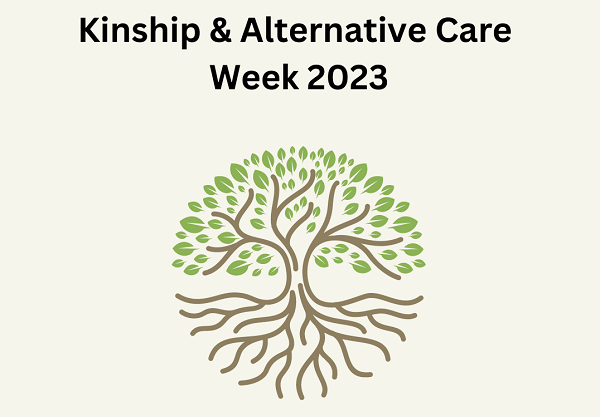September 18 to 22 is Kinship & Alternate Care Awareness Week. During this week, children’s aid societies and Indigenous Child and Family Well-Being Agencies celebrate the family and community members who support children and youth when they need it most.
When it is not possible for children or youth to live with their primary caregiver, child welfare agencies first look to family and community for placement options. Kinship placements can involve biologically related kin, members of cultural communities, or individuals with other social, emotional, or community connections, such as teachers, coaches, or neighbours.
Children and youth who are supported by people they know feel safer, happier, and have better long-term outcomes. Prioritizing placements with family, kin, community members, and other caring adults is a critical part of the work to address the overrepresentation and disparities in outcomes for Indigenous, Black, racialized, and 2SLGBTQ+ children and youth. By placing children and youth with a caring adult they are connected to, they can maintain relationships integral to their well-being, including community and cultural, and receive identity-affirming care. Click here to learn more.
This year during Kinship & Alternate Care Awareness Week, OACAS is reflecting on the various layers – identity, relationships, organizations, community collaborations, and government – that influence the well-being of children and youth, as well as the family and community members who support and care for them.
Alongside members, we are calling on the province to ensure kin/kith and alternative caregivers have access to the supports and services they need. We urge Ontario to:
- Ensure kin/kith and alternate caregivers receive financial assistance that meets their unique, individualized needs. Often kin/kith do not expect to become caregivers and, when they do, there is an immediate need to set up care for children and youth and balance new and ongoing expenses. We suggest mirroring the financial assistance provided to foster caregivers by expanding Ontario Permanency Funding to provide equitable, predictable, and ongoing financial support to kin/kith and alternate caregivers through per diems and/or targeted subsidies.
- Increase access to culturally-relevant, trauma-informed, community-based care. Priority areas of investment include health, mental health, education, and childcare. We urge Ontario to identify opportunities to take an integrated, whole-of-government approach to meeting the needs of kin/kith and alternate caregivers. It is critical that they are truly supported in their efforts to promote the health, safety, and well-being of children and youth in their care.
- Promote access to justice. At times, kin/kith and alternate caregivers require legal support and services as they navigate interactions with the Ontario child welfare system. The province must ensure they have access to options outside of the courtroom responsive to their unique needs, such as mediation, arbitration, and family group conferences. Kin/kith and alternate caregivers must also have consistent, timely access to independent legal advice and representation to make an informed decision about the options available to them.
It is critical for the province to reduce barriers to community-based care through enhanced investments so children, youth, families, and caregivers have access to holistic, wraparound services that will meet their unique needs and promote their health, safety, and well-being.
“OACAS and our members are grateful to the family and community members who support children and youth when they need it most. It is not easy. We remain committed to working with Ontario to ensure family, kin-, and alternate caregivers have the full range of supports and services they need to promote and maintain the health, safety, and well-being of the children and youth in their care,” said Solomon Owoo, Interim CEO, OACAS.
Learn more about placements with family, kin, community members, and alternate caregivers here.
